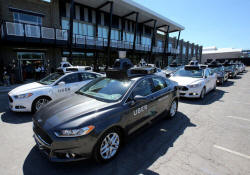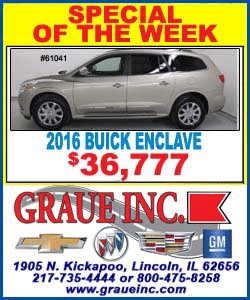|
Waymo has 'no smoking gun'
in Uber self driving car case -U.S. judge
 Send a link to a friend
Send a link to a friend
 [May 04, 2017]
By Dan Levine and Alexandria Sage [May 04, 2017]
By Dan Levine and Alexandria Sage
SAN
FRANCISCO (Reuters) - A U.S. judge on Wednesday said he had not seen
clear evidence that Uber Technologies Inc had conspired with an engineer
on its self driving car program to steal trade secrets from Alphabet
Inc's Waymo, and that he was wrestling with whether to issue an
injunction against the ride service.
At a hearing in San Francisco federal court, U.S. District Judge William
Alsup said it was undisputed that the engineer, Anthony Levandowski,
downloaded about 14,000 documents shortly before he stopped working for
Waymo.
If it were proven that Levandowski and Uber conspired in taking Waymo's
information, that could have dire consequences for Uber, say legal and
ride-hailing industry experts.
Uber's $68 billion valuation is supported partly by investors' belief it
will be a dominant player in the emerging business of self-driving cars.
However, Alsup expressed skepticism over whether Uber actually used any
Waymo trade secrets.
"I've given you lots of discovery, and so far you don't have any smoking
gun" showing that Uber knew Levandowski possessed any Waymo trade
secrets, Alsup said.
Waymo attorney Charles Verhoeven said the company suspects such evidence
exists. Levandowski declined to answer questions during a deposition,
citing his constitutional rights against self incrimination.

Verhoeven also said Uber was improperly withholding thousands of
documents on the grounds that they are confidential legal documents.
The judge did not make a ruling from the bench on Wednesday.
The hearing is the latest phase in a courtroom battle over trade secrets
that threatens to topple a central pillar of Uber's growth strategy.
Autonomous cars promise to change the economics of the ride-hailing
business.
Among Uber's biggest expenses is the cost of attracting drivers, who
have a high turnover rate. And Uber's ability to expand into suburban
and rural markets, and areas with low vehicle ownership, and continue to
offer a ride within three minutes, largely hinges on the availability of
a network of self-driving vehicles.
Waymo on Wednesday sought to buttress its case by arguing that
Levandowski and Uber had conspired against Waymo. It said the engineer
was planning to work for Uber while he still was employed at Waymo.
[to top of second column] |

A fleet of Uber's Ford Fusion self driving cars are shown during a
demonstration of self-driving automotive technology in Pittsburgh,
Pennsylvania, U.S. on September 13, 2016. REUTERS/Aaron Josefczyk/File
Photo

Levandowski formed a self-driving trucking company, Otto, after leaving
Waymo, and Uber later bought Otto.
Waymo attorneys showed a slide of an Uber document showing Levandowski
had been promised 5.3 million restricted stock units of Uber. That was
worth more than $250 million in January 2016, the lawyer said, without
describing in detail the basis of the valuation.
An Uber spokesman said the stock award was actually made in connection
with Uberís acquisition of Otto in August 2016, and the vesting start
date was backdated to late January so that Levandowski's time at Otto
counted for the Uber vesting schedule.
Alsup himself did not appear shocked. "So what? Thatís a lot of money I
guess, but why wouldnít he get a lot of money?" he asked.
Verhoeven said it was circumstantial evidence of bad intent by
Levandowski and Uber. "Heís getting awarded stock by Uber when heís
supposedly starting his own company," he said.
Uber attorney Arturo Gonzalez on Wednesday said that attorneys had spent
more than 6,000 hours on document review and had not found any sign of
the Waymo documents in Uber's system.
Alsup complimented Uber's search efforts. However, the judge said that
documents Uber has withheld about its acquisition of Otto are "a
treasure trove" that will be key to the case. He has not decided whether
Uber has properly shielded those documents.
The judge also said he was still considering whether to send Waymo's
trade secret claims to arbitration, which would not be public.
(Refiles to correct typographical error to 'whether' instead of 'wither'
paragraph 13)
(Reporting by Heather Somerville, Alexandria Sage and Dan Levine in San
Francisco, editing by Peter Henderson and Grant McCool)
[© 2017 Thomson Reuters. All rights
reserved.] Copyright 2017 Reuters. All rights reserved. This material may not be published,
broadcast, rewritten or redistributed.

 |